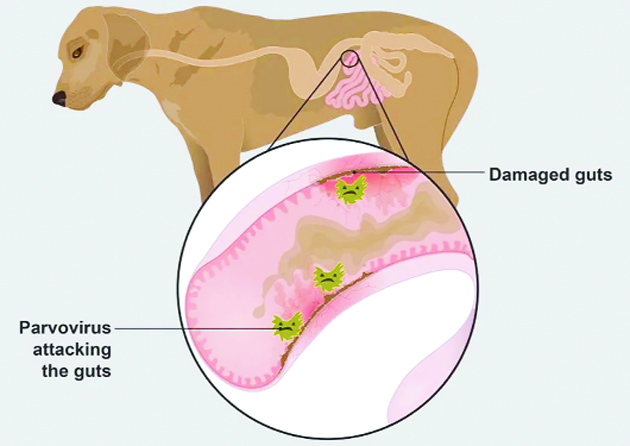Parvovirus, specifically canine parvovirus (CPV), is a highly contagious viral disease that primarily affects dogs. It is a widespread and potentially life-threatening illness, particularly in puppies and dogs with weak immune systems. Here is some essential information about parvovirus:
1. Transmission: Parvovirus is transmitted through direct contact with infected dogs or their feces. The virus can survive in the environment for several months and is resistant to heat, cold, and many disinfectants. Dogs can become infected by sniffing or licking contaminated surfaces or through contact with infected dogs.
2. Types of Parvovirus: Canine parvovirus is categorized into two types: CPV-2a and CPV-2b. Both types cause similar symptoms and are highly contagious. CPV-2c is a variant that emerged in recent years and is associated with a milder form of the disease.
3. Symptoms: The most common symptoms of parvovirus infection include severe diarrhea, vomiting, loss of appetite, lethargy, fever, and dehydration. The virus attacks the lining of the intestines, causing damage and leading to bloody diarrhea. The disease weakens the immune system, making dogs vulnerable to secondary infections.
4. Diagnosis: Veterinarians typically diagnose parvovirus through a combination of clinical signs, physical examination, and laboratory tests. These tests may include a fecal antigen test, blood tests to check for a decreased white blood cell count, and imaging studies to assess the condition of the intestines.
5. Treatment: Treatment for parvovirus infection involves supportive care to manage symptoms and provide necessary fluids and electrolytes. Intravenous fluid therapy is commonly administered to combat dehydration, and antibiotics may be prescribed to prevent secondary bacterial infections. Infected dogs require isolation to prevent the spread of the virus.
6. Prevention: Vaccination is crucial in preventing parvovirus infection. Puppies should receive a series of vaccinations starting at around six to eight weeks of age and continuing until they are 16 weeks old or older. Adult dogs should receive regular booster shots to maintain immunity. It is also important to keep puppies and unvaccinated dogs away from potentially infected areas.
7. Disinfection: Parvovirus is resistant to many disinfectants, but it can be effectively killed with a diluted bleach solution (one part bleach to 30 parts water). Cleaning the environment thoroughly with this solution helps to eliminate the virus.
8. Human Risk: Parvovirus is species-specific, meaning it primarily affects dogs and cannot infect humans. However, humans can inadvertently transfer the virus on their clothes, hands, or footwear, potentially spreading it to susceptible dogs. It is essential to practice good hygiene when handling or being around infected dogs.
If you suspect your dog may have parvovirus or have concerns about prevention, it is crucial to consult a veterinarian for proper diagnosis, treatment, and guidance.
#PetCare #dogcare #dogshealth
#chtkennels #dogboarding #dogsofinstagram #dogdaycare #doggydaycare #doggiedaycare #doglovercare #dogsitting #dogloverscare #doglifecare #dogstagram #dogsitter #petsitter #petboarding #petsitting #petcare #puppycare #dogoftheday #dogsofinsta #instadog #lovedogs #petservices #doghotel #dogslife #happydogs #happydog #petboarding #ilovedogs #petresort #daycare #boarding #petsofinstagram #dogboarder #playtime #dogphotography #dogsofinstaworld #dogtrainer #furbabies #doglove #dogsofig #dogmom #dogdad
dog boarding near me | dog hostel near me | pet boarding near me | doggy daycare near me | dog boarding | dog care near me
Call us on 7032624506 for more information or Whatsapp: https://wa.me/917032624506

No comments:
Post a Comment